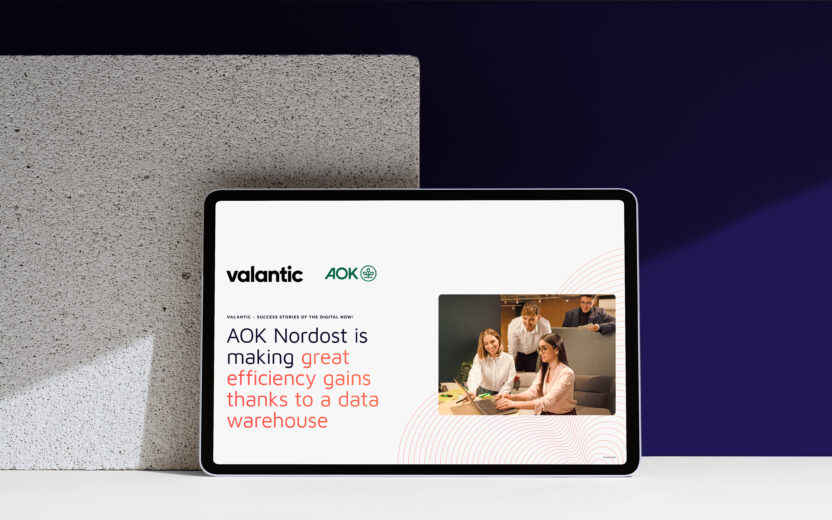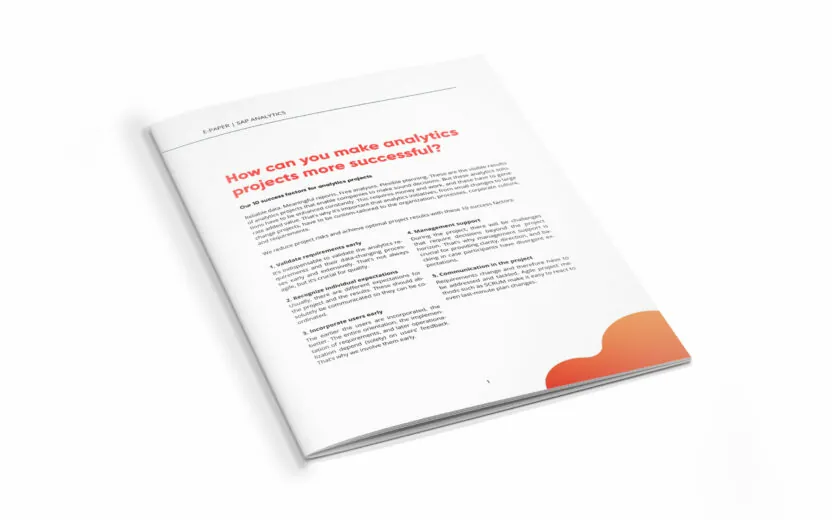Highlight

Successful together – our valantic Team.
Meet the people who bring passion and accountability to driving success at valantic.
Get to know usEfficient data integration and decision-making
SAP BusinessObjects offers powerful data integration, analysis, and reporting functions that help companies make informed decisions. The platform provides a comprehensive view of business data, promotes collaboration thanks to easily accessible information, and optimizes business processes through efficient use of business intelligence.

In a data-driven business environment, it is critical to gain relevant insights from large amounts of information quickly. SAP BusinessObjects is a business intelligence (BI) platform that enables companies to create reports, visualize data, and identify trends that are indispensable for making strategic decisions.
The flexibility of SAP BusinessObjects allows you to integrate data from multiple sources, such as Microsoft Office or Salesforce, and translate it into meaningful dashboards and reports. The platform includes various tools such as Crystal Reports for reporting, Web Intelligence for ad-hoc analysis, OLAP, and dashboards for interactive data visualization. Business objectives such as analyzing financial data, tracking sales performance, and optimizing operational processes can be achieved easily with the intuitive user interface and powerful analytics tools. The platform supports both ad-hoc queries and report automation, allowing users to focus on their interpretation rather than their creation.
SAP BusinessObjects can be deployed both as a cloud-based tool and locally. In addition, the product is also compatible with IOS and Android products as a mobile app.
SAP BusinessObjects provides a robust and versatile platform that helps companies leverage their data and make strategic decisions.
Comprehensive data integration
Powerful data analysis
Automated reporting
User-friendly
Make better decisions
Optimize business processes

Success Story AOK Nordost
By working with valantic, AOK Nordost has modernized its data warehouse and achieved enormous efficiency gains.

Your guide: The 10 success factors for analytics projects
Learn from our experience and expertise and download our guide “The 10 Success Factors for Analytics Projects”!
Support for migration to SAP S/4HANA

The SAP BO Move campaign is an initiative by SAP that aims to help customers migrate from legacy SAP Business Suite products to advanced solutions such as SAP S/4HANA. The main goal is to simplify and accelerate the transition by providing customers with resources, tools, and services.
The SAP S/4HANA Adoption Starter Engagement is a specific program within this campaign designed to provide customers with a structured and simplified approach to planning their migration. It offers a guided, step-by-step process that begins with an initial self-assessment and leads customers through the various stages of preparation and planning. Specifically, there are nine modules that are supported by the Readiness Check or the SAP Transformation Navigator.

With the Readiness Check, users of an SAP ECC 6 system can carry out the migration to SAP S/4HANA with support. The tool enables a self-check of the state of the technical requirements and guides the user through the migration to S/4HANA.
The current system environment can be evaluated with the Transformation Manager. By identifying the most important technical components before the process begins, the migration to the S/4HANA can be tailored specifically to a customer’s system.
The engagement includes workshops, best practices, and tools to assess business processes and identify the value of SAP S/4HANA. The goal of the program is to develop a clear roadmap and a business case for migration.
Efficient migration to SAP Analytics Cloud
The NDC Converter is a tool that facilitates the transition from SAP BusinessObjects to SAP Analytics Cloud (SAC) . It plays a critical role in migrating data connections and reports, helping to make the process efficient and error-free.
The converter helps transform the data source connections defined in SAP BusinessObjects into a format that is compatible with SAP Analytics Cloud. This means that connections to databases, data warehouses, and other data sources can be maintained without having to manually recreate them in SAC. Dimensions, measures, and report structures can be read in and adopted. This automation of the conversion not only saves time, but also reduces the significant manual effort required for migration. Although manual work is still required for complex scenarios and fine-tuning, between 60% and 70% less time is required for the migration process. It is also supported by an NDC expert.

Manuel Essers
SAP Analytics Manager, CoE Lead SAP Planning & Reporting
valantic